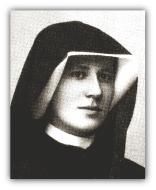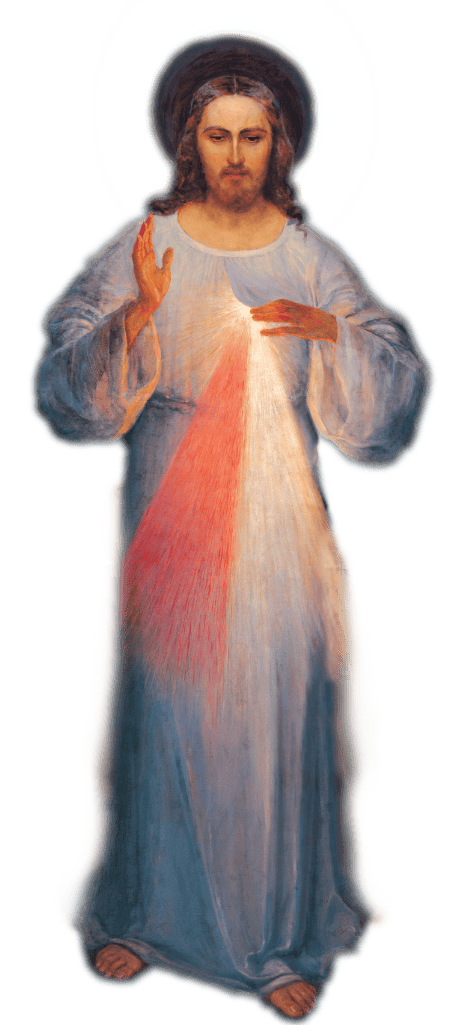SAINT sister FAUSTINA
(1905-1938)

Saint Faustina Kowalska, the world-famous apostle of Divine Mercy and one of the greatest mystics of the Church, was born on 25 August 1905 in Głogowiec (Łódź region, central Poland). She was the third of ten children, in a poor Catholic peasant family. At her baptism, in the nearby parish church of Świnice Warckie, she was given the name Helena. During her childhood, she distinguished herself by acts of piety, love of prayer, hard work, obedience and great sensitivity to human suffering.
Although she completed only three years of schooling, in her Diary she clearly described what she wanted to achieve, simply, precisely, without any ambiguity. In (Diary, 7), she wrote about her experiences from childhood: “From the age of seven, I experienced the sure call of God, the grace of a religious vocation. In the seventh year of my life, for the first time, I heard the voice of God in my soul; that is, the call to a more perfect life. But I did not always obey the call of grace. I did not meet anyone who could explain these things to me.” At the age of sixteen, she left her family home for the nearby city of Aleksandrów (Poland) and then moved to Łódź (Poland), where she worked as a maid to support herself and help her parents. During this time, the desire to enter a monastery gradually grew within her. Because of her parents’ objections, the young Helena tried to dampen the call of God. Years later, she recalled this in (Diary, 9-10): “Once I was dancing with one of my sisters and while everyone was having fun, my soul was going through inner suffering. As I began to dance, I suddenly saw Jesus beside me, Jesus in pain, stripped, covered with wounds, who spoke these words to me: “How long must I suffer and how long will you deceive me?” At that moment the charming music stopped and everyone disappeared from my sight; only Jesus and I remained. I sat down next to my beloved sister, pretending to have a headache to hide what was going on in my soul.
After a while, I slipped out unnoticed, leaving my sister and all my companions behind, and went to St. Stanislaus Kostka (Łódź).It was almost dusk; there were only a few people in the church. Ignoring what was going on around me, I prostrated myself before the Blessed Sacrament and asked the Lord to be kind enough to let me understand what I should do next. Then I heard these words, “Go to Warsaw (Poland) immediately, you will enter a monastery there”. I got up after praying, returned home and took care of the things that needed to be done. I confided in my sister what was going on in my soul in the best way I could. I told her to say goodbye to our parents and so, wearing only a dress, without taking any other belongings, I went to Warsaw.” In Warsaw, she knocked on the doors of many convents but to no avail. Finally, on August 1, 1925, she applied to the Congregation of the Sisters of Our Lady of Mercy, located on Żytnia Street in Warsaw and was accepted. However, before that, in order to meet the conditions and prepare her habit, she worked as a housekeeper near Warsaw for a family with many children. In her Diary, she described her feelings when she entered the convent: “I felt as if I had entered the life of Heaven. A single prayer poured out from my heart, a prayer of thanksgiving” (Diary, 17). Upon entering the Congregation, Helena took the name of Sister Mary Faustina.
She completed her probation in Cracow, where she made her first profession in the presence of Bishop Stanislaus Rospond, and five years later, made her perpetual vows of chastity, poverty and obedience. She was assigned to work in various houses of the Order, spending most of her time in Cracow, Płock and Vilnius, as cook, gardener and porter. Her extremely rich mystical life was not seen by others in the monastery or outside. She carried out her duties with zeal and faithfully observed all the rules of the monastery. She was focused and silent, but at the same time spontaneous and cheerful, full of kind and selfless love for her neighbors. The harsh lifestyle and exhausting fasting that she had practiced even before entering the Congregation had weakened her body to such an extent that during her novitiate she had to be taken for medical treatment. After her first year in the novitiate, she underwent an unusually painful mystical experience: her so-called “dark night,” and then the spiritual and moral sufferings connected with the fulfillment of the mission that Jesus had entrusted to her.
Sister Faustina sacrificed her life for sinners to save their souls; for this she underwent various sufferings. As a result, she underwent two hospital stays, each lasting several months. Completely devastated physically and mentally,
Physically, but spiritually fully mature, mystically united with God, she died in Cracow-Łagiewniki on October 5, 1938, in an atmosphere of holiness, having lived only 33 years, including 13 years in the convent. (See note in the Diary of St. Faustina)On April 30, 2000, Pope John Paul II canonized Sister Faustina at the Vatican.
PRAYER FOR OBTAINING GRACES
THROUGH THE INTERCESSION
OF SAINT FAUSTINA
O Jesus, You inspired Saint Faustina
with profound veneration for Your boundless Mercy,
deign, if it be Your Holy Will, to grant me,
through her intercession,
the grace for which I fervently pray…………………
My sins render me unworthy of Your Mercy,
but be mindful of Saint Faustina’s spirit of sacrifice and self-denial,
and reward her virtue by granting the petition which,
with childlike confidence,
I present to You through her intercession.
Our Father…,
Hail Mary…,
Glory be…
